The event, organised by the UK’s Public Accounts Committee, invited the committee’s counterparts from around the world to London to encourage greater collaboration on common tax issues that increasingly reach beyond national borders.
The most prominent of these at the moment is tax avoidance and evasion, which affects countries from the developed and developing world alike – albeit with differing severity – and can only be tackled with international cooperation.
Opening the summit, Meg Hillier, chair of the UK’s PAC, stressed that parliamentary committees tasked with scrutinising government finances everywhere should work together and coordinate on such issues.
She noted there were 33 tax jurisdictions represented at summit, altogether representing around two billion people – “a powerful bunch” with a strong “voice” that should be listened to.
“We as a global community of parliamentarians can put pressure on governments to work together to stop global tax avoidance,” she continued. “Governments can be cautious. Often they don’t want to act alone.
“We have a role, as parliamentarians representing our citizens, to push our respective governments to act.”
At the conclusion of today’s summit – which Hillier emphasised should be the first of many annual meetings – 26 MPs from jurisdictions across Europe, Africa, Asia and beyond signed an open letter to their governments calling for greater transparency.
In particular, the letter called on governments to oblige multinational firms to publish detailed reports on their business activities in every country in which they operate for all to see – not just tax authorities.
But while numerous speakers on the event’s panels emphasised the benefits of improved transparency, especially when it is given to the public, others noted that much more also needs to be done.
Rita de la Feria, professor of tax at the University of Leeds, and professor Michael Devereux, director of the Oxford University Centre for Business Taxation, highlighted that the global tax system is fundamentally unfit for purpose.
The rules that govern it were designed in the 1920s, they both agreed, and do not make sense in today’s globalised and digitised world.
The response has been a “staggering” spread of anti-avoidance measures that in itself should be an indication that something is very basically wrong, said de la Feria.
As a result, the OECD’s BEPs project, which aimed to tackle multinational tax avoidance, can be only a “temporary solution” that addresses the symptoms of the problem rather than the causes, she stated.
And even this effort has been only partially successful, other panellist said.
Alex Cobham, chief executive of Tax Justice Network, explained that because many poorer countries struggle to access the same information through the BEPs instruments as their more advanced counterparts, the project has to some degree exacerbated the inequalities that preceded it.
At another panel session, Fabio de Masi, a German MEP who sits on the European Parliament’s Panama Papers inquiry committee, agreed there was a long way to go. He highlighted that he has personally paid 600 times more tax in the European Union than Apple, and said Europe expects many more such scandals to emerge.
He added: “It is one thing to say countries subscribe to certain legal standards [such as the BEPs framework], but there is also the issue of constructive non-compliance.” Many states that are not even considered risky jurisdictions continue to engage in shady tax practices, he said.
The event also heard from:
· Edward Troup, executive chair and permanent secretary of HM Revenue and Customs in the UK, who stressed the need for confidentiality as well as transparency;
· Hans Christian Holte, director general of the Norwegian Directorate of Taxes, who discussed the benefits of publishing the net income and tax paid of every Norwegian citizen and company;
· Colin Powell, advisor to the chief minister of Jersey, who spoke about the island’s transparency efforts.
But, the irony of discussing transparency initiatives in one of the world’s most well-known secrecy jurisdictions was not lost on other panel members or the audience.
The challenge for Jersey at #gttsummit is it remains utterly opaque so it is absurdly implicitly claiming to do transparency in secret
— Richard Murphy (@RichardJMurphy) 9 December 2016














